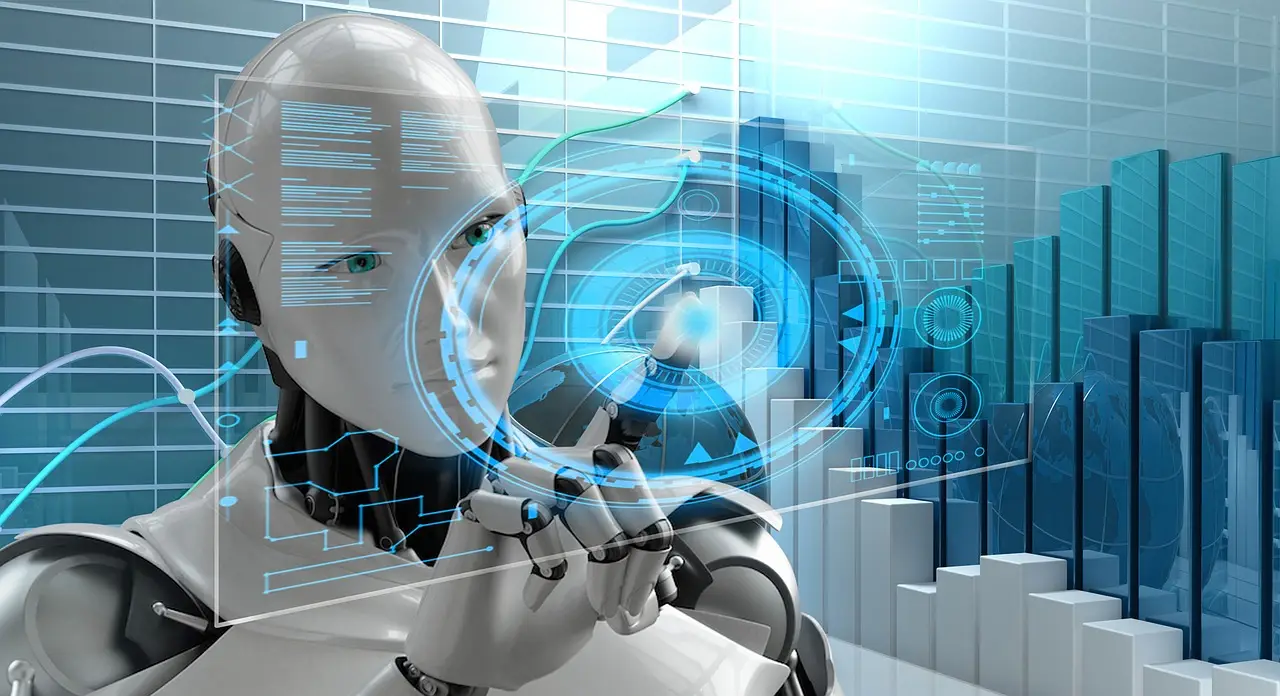Artificial Intelligence
Artificial Intelligence (AI) has emerged as a transformative force across numerous industries, revolutionizing how we work, communicate, and interact with technology. From enhancing efficiency in business operations to powering groundbreaking innovations in healthcare and beyond, the applications of AI are vast and continuously expanding.
Sectors:
- Healthcare:
- AI-driven diagnostics: AI algorithms are being employed to analyze medical images, such as X-rays, MRIs, and CT scans, aiding in the detection of diseases like cancer, tuberculosis, and more with remarkable accuracy.
- Personalized treatment plans: AI algorithms analyze patient data to develop personalized treatment plans, considering factors like genetics, medical history, and lifestyle choices.
- Drug discovery: AI accelerates the drug discovery process by predicting molecular interactions, identifying potential drug candidates, and optimizing clinical trials, leading to faster and more cost-effective development of new medications.
- Remote patient monitoring: AI-powered devices enable remote monitoring of patients’ vital signs and health metrics, facilitating early intervention and improving patient outcomes.
- Finance:
- Algorithmic trading: AI algorithms analyze vast amounts of financial data in real-time to identify market trends, execute trades, and optimize investment strategies, leading to improved returns and reduced risks.
- Fraud detection: AI systems detect fraudulent activities by analyzing patterns in transactions, identifying anomalies, and flagging suspicious behavior, thus safeguarding financial institutions and customers against fraud.
- Customer service: AI chatbots provide personalized assistance to customers, answering queries, resolving issues, and processing transactions efficiently, enhancing the overall customer experience.

- Transportation:
- Autonomous vehicles: AI powers self-driving cars and trucks, enabling them to navigate roads, interpret traffic signals, and avoid obstacles autonomously, promising safer and more efficient transportation systems in the future.
- Traffic management: AI algorithms analyze traffic patterns, optimize signal timings, and predict congestion to improve traffic flow and reduce travel time for commuters.
- Predictive maintenance: AI systems monitor the condition of vehicles and infrastructure, predicting maintenance needs, scheduling repairs, and minimizing downtime, thereby enhancing operational efficiency and safety.
- Education:
- Personalized learning: AI platforms adapt educational content and teaching strategies to students’ individual learning styles, preferences, and pace, facilitating personalized learning experiences and improving academic outcomes.
- Intelligent tutoring systems: AI-powered tutoring systems provide students with interactive lessons, feedback, and support, helping them master difficult concepts and skills more effectively.
- Learning analytics: AI analyzes educational data to identify patterns, trends, and areas for improvement, enabling educators to make data-driven decisions and enhance teaching practices.
- Manufacturing:
- Predictive maintenance: AI-powered predictive maintenance systems analyze sensor data from machinery, detecting anomalies, predicting failures, and scheduling maintenance proactively, reducing downtime and maintenance costs.
- Quality control: AI algorithms inspect products on the production line for defects, ensuring consistent quality standards and reducing waste.
- Supply chain optimization: AI optimizes inventory management, demand forecasting, and logistics operations, minimizing costs, improving efficiency, and enhancing overall supply chain performance.
- Marketing and Advertising:
- Targeted advertising: AI algorithms analyze consumer data to personalize advertisements and marketing campaigns, targeting specific demographics, interests, and behaviors more effectively.
- Customer segmentation: AI segments customers based on their characteristics, preferences, and buying behaviors, enabling businesses to tailor their marketing strategies and offerings to different customer segments.
- Sentiment analysis: AI systems analyze social media posts, reviews, and other sources of online content to gauge public sentiment and track brand perception, informing marketing strategies and reputation management efforts.
The applications of artificial intelligence are vast and diverse, spanning across numerous industries and sectors, from healthcare and finance to transportation, education, manufacturing, and marketing. As AI technologies continue to evolve and mature, they hold the potential to drive innovation, improve efficiency, and enhance human well-being in unprecedented ways. However, it’s essential to address ethical, privacy, and security concerns associated with the widespread adoption of AI to ensure its responsible and beneficial integration into society. With ongoing research, collaboration, and thoughtful regulation, artificial intelligence can truly revolutionize the world for the better.
